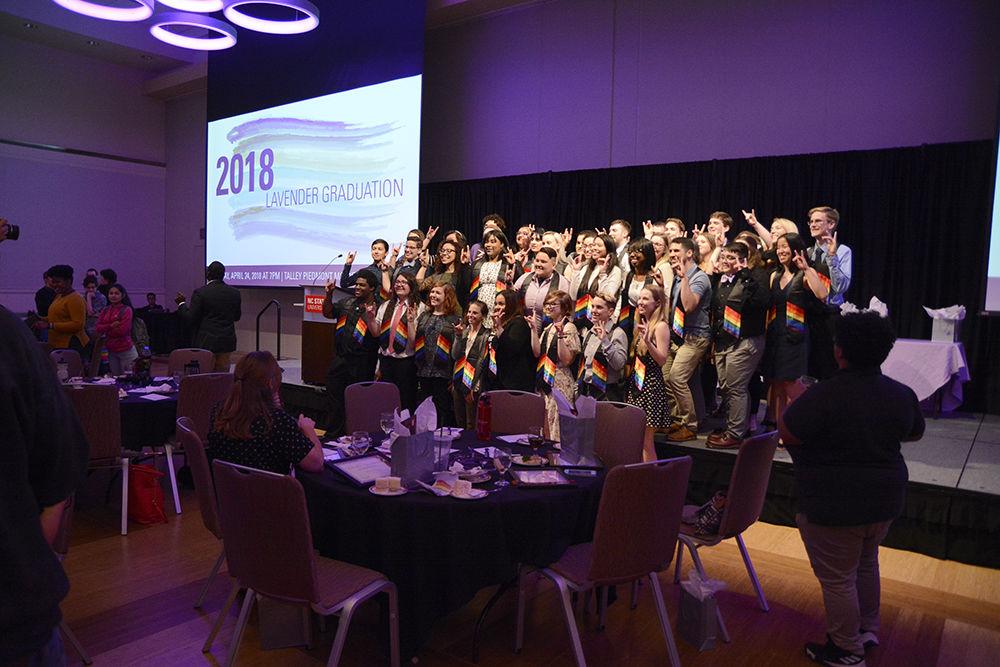
Glenn Wagstaff
The graduating class of the GLBT Center at NC State University put up wolfies and pose for a group photo at Lavender Graduation in Talley ballroom on Tuesday. The event honors the contributions of the LGBT community at NC State in advocacy, producing change, and growing as individuals of the student population at N.C. State.
Over 50 students at NC State participated in Lavender Graduation, an event created to highlight and honor the accomplishments of students who identify as part of the GLBT community on Tuesday evening.
Lavender Graduation provides GLBT students graduating in the spring, summer, and fall of the academic year, a platform to celebrate their achievements with the community on NC State’s campus. Preston Keith, associate director of the GLBT Center at NC State, said that the event is held to honor students achievements and celebrate students who have excelled despite the roadblocks they have faced.
“It’s an opportunity to really honor their achievements and accomplishments and honor their identities,” Keith said. “Recognizing that there are barriers that exist for students who identify as GLBT and taking a moment to reflect on that and celebrate them for accomplishing overcoming those barriers to get to this point in their career and wishing them moving forward.”
The event consisted of an alumni speaker, Kayla Overdiep who is part of NC State College Advising Corps, who discussed her experience of being a queer woman of color in the working world. Nury Castro, a second-year graduate student and GLBTCA VP, talked about the importance of finding people that are supportive and the significance of educating oneself to succeed.
“Lavender Menace” was a term that was historically used by individuals who intended to exclude individuals who identified as part as the LGBT community. Renee Wells, director of the GLBT Center at NC State, discussed as how the term “lavender” has been reclaimed by the community as a form of empowerment.
“Lavender has become this thing that we’ve reclaimed as this power symbol,” Wells said. “For instance, when feminists were trying to keep lesbians out because it made the movement look bad, a bunch of lesbian activists showed up at one of the feminist events with T-shirts that said ‘Lavender Menace,’ proudly marching around. It’s a powerterm about being really proud of who we are and not silencing ourselves or not being ignored or allowing ourselves to be ignored by other people.”
Franesqa Santes, a second-year graduate student studying higher education administration, said that a supportive community is key for helping students succeed in a university environment.
“I think a queer community is very important for success, just part of looking at the research, queer students are at higher risk for mental health [issues],” Santes said. “Their sense of belonging is a little different than for traditional students, so working really intentionally to create a space for those students is really key. I’m a student in higher education so within the university to be really intentional to build a space and community for these students is really key.”
Austin Bryan, a second-year studying Africana studies, talked about how the experiences of being a member of the GLBT community are to be celebrated because of the individuals that participate and contribute to a vast variety of spaces on campus.
“I think that a lot of students who do identify with the LGBT community go through a lot as being students as being peer educators as being whatever they do on campus and I think that it’s a lot to identify as LGBT or an ally, and be a student at the same time so it’s exciting to celebrate that,” Bryan said.
Recognizing individuals as the identity they wish to be known by is the intention of the event. Keith said that seeing how proud students are of their accomplishments is his favorite part of the event.
“I think seeing the joy of people being able to be recognized in their authentic identity,” Keith said. “There are some places and some spaces that don’t honor people for their names and their pronouns, that don’t honor people for their accomplishments that they do on campus. Being able to honor them in their fullest forms is one of the biggest takeaways that I have.”